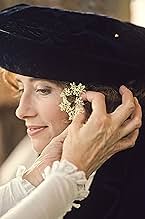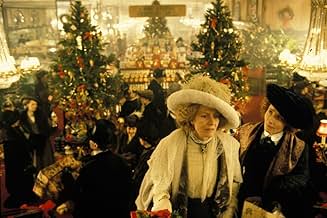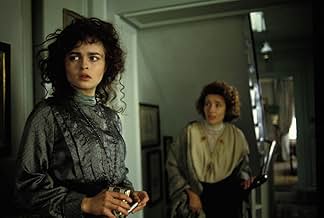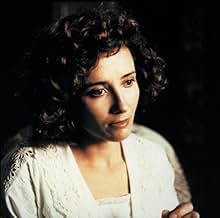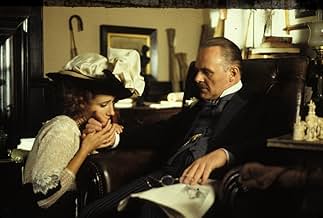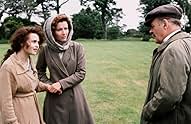NOTE IMDb
7,4/10
38 k
MA NOTE
Un homme d'affaires contrecarre le legs d'une demeure fait par sa femme à une autre femme.Un homme d'affaires contrecarre le legs d'une demeure fait par sa femme à une autre femme.Un homme d'affaires contrecarre le legs d'une demeure fait par sa femme à une autre femme.
- Réalisation
- Scénario
- Casting principal
- Récompensé par 3 Oscars
- 32 victoires et 49 nominations au total
Avis à la une
...and I must admit that on the first viewing, I didn't get it myself.
I'm one of those relative rarities: a straight male that normally enjoys Merchant-Ivory productions. However, I disliked this movie on first viewing (several years ago). In retrospect, I can see that I was not reacting to the movie, but my intense dislike for Anthony Hopkins' character.
I watched it again the other night and was absolutely blown away by it. What a film! Emma Thompson won Best Actress for her performance, and she did her usual terrific job, but frankly I was more impressed by the performance of Helena Bonham Carter. The style of the film is magnificent.
This is a story (like most of E. M. Forster's) about the injustices of class distinctions. However, with a subtlety that I missed on my first viewing, this film is also about karma (what goes around - comes around) and a story of social progress. This film is set in a time when society is coming out of the Victorian age and into the Edwardian. You see contrasts of the past thinking with the progressive thinking all through the movie. A visual metaphor is repeated over and over: the turning of cranks, whether it be on a new-fangled morse code machine, a vintage car, or the wheels of a mighty locomotive. I believe that this represents both karma and progress, forces which Forster sees as unstoppable as the laws of nature.
This is an incredible story, and an incredible piece of film-making.
I'm one of those relative rarities: a straight male that normally enjoys Merchant-Ivory productions. However, I disliked this movie on first viewing (several years ago). In retrospect, I can see that I was not reacting to the movie, but my intense dislike for Anthony Hopkins' character.
I watched it again the other night and was absolutely blown away by it. What a film! Emma Thompson won Best Actress for her performance, and she did her usual terrific job, but frankly I was more impressed by the performance of Helena Bonham Carter. The style of the film is magnificent.
This is a story (like most of E. M. Forster's) about the injustices of class distinctions. However, with a subtlety that I missed on my first viewing, this film is also about karma (what goes around - comes around) and a story of social progress. This film is set in a time when society is coming out of the Victorian age and into the Edwardian. You see contrasts of the past thinking with the progressive thinking all through the movie. A visual metaphor is repeated over and over: the turning of cranks, whether it be on a new-fangled morse code machine, a vintage car, or the wheels of a mighty locomotive. I believe that this represents both karma and progress, forces which Forster sees as unstoppable as the laws of nature.
This is an incredible story, and an incredible piece of film-making.
Howard's End is not an easy movie to sit through if you do not typically watch period films. The language and euphemisms are very old fashioned (1910). But if you really sit back and watch the story unfold you will become engrossed. The crafting of the story by Merchant Ivory is impeccable. They tell the story so visually that you may not notice how physically alike Margaret Schlegel is to Ruth Wilcox in carriage and deportment, but the light-bulb goes off when the housekeeper of Howard's End mistakes Margaret for Ruth. The story itself is so quiet and brilliant that you don't realize something so very profound has happened until the credits roll. Every performance is amazing, but Emma Thompson (she won the Best Actress Oscar) and Vanessa Redgrave stand out. Their scenes together are so full of nuances that it's hard to take it all in during a first viewing.
For those who want to watch an intelligent, lovely-to-look-at motion picture, it doesn't get much better than this. The film tells the story of two sisters, of limited but respectable means, who collide with the world of the very rich in Edwardian England. One sister benefits from the acquaintance with the wealthy Wilcoxes. The other is all but destroyed by it. Along the way, there are charming scenes of tea parties and music classes, elegant costumes, fantastic settings, and engaging conversations. There is also a sad, secondary storyline of a poor clerk and his wife who, unfortunately, slip into even more abysmal circumstances through no fault of their own. The ending is tinged with despair, even as it offers some hope for both of the sisters' futures. The film should be commended as well for the fine performances of Emma Thompson, Anthony Hopkins, Helena Bonham-Carter and others. Any discriminating film enthusiast will not want to miss this movie.
If it's raining, if it's late, if I'm tired of working, if I'm restless or if I'm in a quandary of sorts, "Howard's End". I put the film on and Emma Thompson - presumably with the help of her accomplices, Ivory, Jhavhala, Hopkins etc - takes me away from whatever mood I'm trying to escape and leads me through her own, brilliantly drawn, gently torturous path. I don't recall when was the last time an actress has had this kind of power over my own psyche. The film is constructed with an Ivory attention to detail worthy of a vintage Visconti. The screenplay has no lapses of any kind and never falls into the usual traps. Loyal to its source material and yet, cinematic in the most revolutionary traditional sense of the word. The Britishness of Anthony Hopkins character is turned upside down giving us a glimpse into a character that's a mass of contradictions. But it is Emma Thompson's film from beginning to end. What a glorious achievement.
I'm sure that even in 1910 when Kaiser Wilhelm still had a few fans who remembered he was the grandson of Queen Victoria and not ruler of the soon to be hated foe of World War I, E.M. Forster must have come in for a few critic's slings in having some of his protagonists of Howards End have a German surname. Even that early time there were many who saw Germany as a potential foe.
These two Schlegel sisters played by Emma Thompson and Helena Bonham Carter befriend the Wilcoxes, a family of newly rich plutocrats headed by Anthony Hopkins who seem to be a version of Lillian Hellman's the Hubbards lite. Their mother is the class of the family and she's played by Vanessa Redgrave who is in poor health.
While Bonham-Carter is rejected by Hopkins's son James Wilby as a suitable wife for marriage, Vanessa befriends Thompson finding her to be a kindred intellectual spirit in a house full of moneygrubbers. In fact before she dies she writes an unsigned note asking that a cottage that's in her family's name called Howards End be given to the Schlegel sisters. When Hopkins and the rest of the family find the note after she's dead it gets torn up and burned. Unsigned it has no probative value in any event.
But as fate would have it Thompson and Hopkins get into a relationship and they soon marry and she tries to polish some of the rough edges off him. Especially in regard to snobbery. Hopkins is the kind of man who wants no reminders of where he came from. Particularly with another of the Schlegel sisters friends, a young clerk named Leonard Bast played by Samuel West trying to make his way in the world as the Wilcoxes have.
Emma Thompson won the Academy Award for Best Actress for Howards End that year and the film also won Oscars for Art&Set Direction and for adapted screenplay. Though Thompson won the Oscar, my absolute favorite in this film is Susie Lindeman as Mrs. Dolly Bast. She's so incredibly common and obviously holding him back, you can't blame West for eventually getting involved with Bonham-Carter which leads to tragedy.
The team of Ismail Merchant producer and James Ivory director succeed again at bringing the look and manners of Edwardian England as seen by E.M. Forster to life. Who says they don't make literate films any more, whoever says that have them see Howards End.
These two Schlegel sisters played by Emma Thompson and Helena Bonham Carter befriend the Wilcoxes, a family of newly rich plutocrats headed by Anthony Hopkins who seem to be a version of Lillian Hellman's the Hubbards lite. Their mother is the class of the family and she's played by Vanessa Redgrave who is in poor health.
While Bonham-Carter is rejected by Hopkins's son James Wilby as a suitable wife for marriage, Vanessa befriends Thompson finding her to be a kindred intellectual spirit in a house full of moneygrubbers. In fact before she dies she writes an unsigned note asking that a cottage that's in her family's name called Howards End be given to the Schlegel sisters. When Hopkins and the rest of the family find the note after she's dead it gets torn up and burned. Unsigned it has no probative value in any event.
But as fate would have it Thompson and Hopkins get into a relationship and they soon marry and she tries to polish some of the rough edges off him. Especially in regard to snobbery. Hopkins is the kind of man who wants no reminders of where he came from. Particularly with another of the Schlegel sisters friends, a young clerk named Leonard Bast played by Samuel West trying to make his way in the world as the Wilcoxes have.
Emma Thompson won the Academy Award for Best Actress for Howards End that year and the film also won Oscars for Art&Set Direction and for adapted screenplay. Though Thompson won the Oscar, my absolute favorite in this film is Susie Lindeman as Mrs. Dolly Bast. She's so incredibly common and obviously holding him back, you can't blame West for eventually getting involved with Bonham-Carter which leads to tragedy.
The team of Ismail Merchant producer and James Ivory director succeed again at bringing the look and manners of Edwardian England as seen by E.M. Forster to life. Who says they don't make literate films any more, whoever says that have them see Howards End.
Le saviez-vous
- AnecdotesDame Emma Thompson received a total of thirteen nominations for her role in this movie. She won in all of those events, which includes an Oscar, a Golden Globe, and a BAFTA as Best Actress.
- GaffesWhen Charlie and Dolly Wilcox are hiding from Margaret Schlegel in the castle, the scene closes with low angle wide shot of the castle with a view of the sky behind it, revealing an aircraft contrail. There were no aircraft capable of leaving high-altitude contrails in the time period this movie is set in.
- Citations
Margaret Schlegel: Will you forgive her as you yourself have been forgiven... you have had a mistress; I forgave you. My sister has a lover, you drive her from the house. Why can you not be honest for once in your life? Why can't you say what Helen has done, I have done!
Meilleurs choix
Connectez-vous pour évaluer et suivre la liste de favoris afin de recevoir des recommandations personnalisées
- How long is Howards End?Alimenté par Alexa
Détails
- Date de sortie
- Pays d’origine
- Site officiel
- Langues
- Aussi connu sous le nom de
- El fin del juego
- Lieux de tournage
- Fortnum & Mason's, Piccadilly, Mayfair, Westminster, Greater London, Angleterre, Royaume-Uni(where Ruth and Margaret do their Christmas shopping)
- Sociétés de production
- Voir plus de crédits d'entreprise sur IMDbPro
Box-office
- Montant brut aux États-Unis et au Canada
- 26 126 837 $US
- Week-end de sortie aux États-Unis et au Canada
- 52 568 $US
- 15 mars 1992
- Montant brut mondial
- 26 476 514 $US
- Durée2 heures 22 minutes
- Couleur
- Rapport de forme
- 2.39 : 1
Contribuer à cette page
Suggérer une modification ou ajouter du contenu manquant

Lacune principale
What was the official certification given to Retour à Howards End (1992) in Canada?
Répondre



